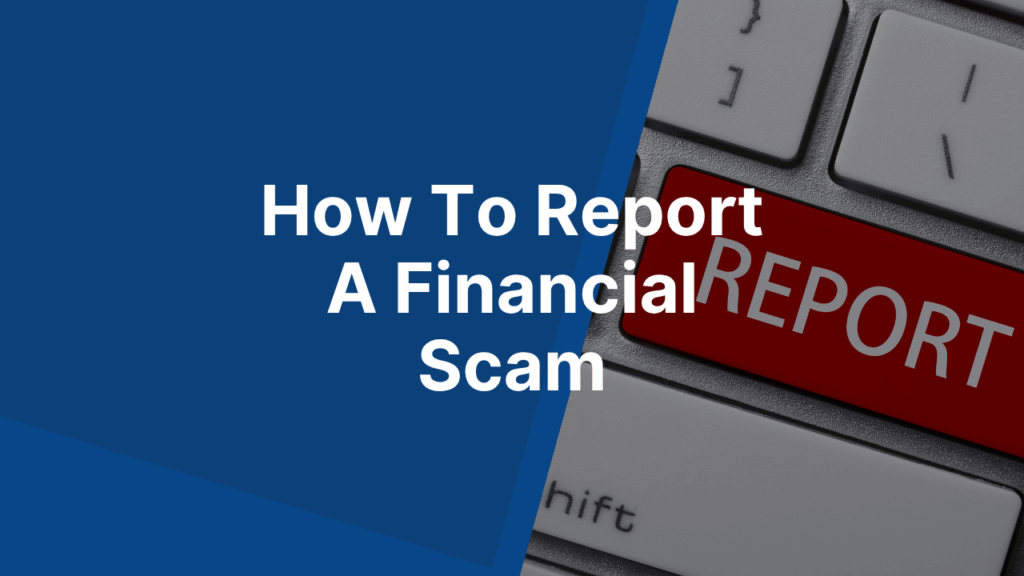If you believe you have seen or been victim to a financial sca,m you should report it to Action Fraud, National Cyber Security Centre, the FCA or the serious Fraud Office immediately.
The more people that report scams the fewer people may lose money. Our research shows that less than 20% of people who are aware of a financial scam report it.
By reporting a scam you could be directly responsible for saving someone from being scammed and losing money.
In the UK there are four main ways to report a financial scam:
Action Fraud – for most online scams
Action Fraud is the UK’s national centre for reporting fraud and cybercrime, serving individuals and businesses in England, Wales, and Northern Ireland. It’s the main route for reporting scams such as fake investment schemes, cloned financial firms, pension frauds, and online impersonation.
Reports can be made online at any time or via telephone during working hours. Once a report is submitted, it’s assessed by the National Fraud Intelligence Bureau, who may pass it to the appropriate police force if there’s enough evidence for further investigation.
Although not all cases lead to direct action, reporting helps build intelligence and can prevent others from becoming victims.
How to report a scam to Action Fraud:
- Online: https://www.actionfraud.police.uk/reportscam
- Phone: 0300 123 2040
Financial Conduct Authority – for unauthorised investment schemes
The Financial Conduct Authority (FCA) is the UK’s financial regulator and deals specifically with unauthorised or fraudulent financial firms. If you’ve come across a company offering financial services without authorisation or pretending to be a regulated business, the FCA is the place to report it.
They maintain a warning list of firms to avoid and can issue public alerts, freeze activities, and pursue enforcement action. Reports can be made online or over the phone, and checking the FCA register before engaging with any financial firm is strongly advised to protect your money and eligibility for compensation schemes.
How to report a scam to the FCA:
- Online: https://www.fca.org.uk/consumers/report-scam
- Phone: 0800 111 6768
National Cyber Security Centre – for suspicious website links
The National Cyber Security Centre (NCSC) handles cyber threats, including phishing emails, scam websites, and online impersonation attempts. It focuses on technical takedowns of malicious sites and threats to UK digital infrastructure.
If you’ve received a suspicious email, SMS, or clicked a link that looked fraudulent, you can forward it to the NCSC’s reporting addresses. The centre uses the information to shut down harmful domains, often within hours. While it doesn’t offer case-by-case support for individual victims, it plays a vital national role in preventing widespread digital fraud.
How to report a scam to the NCSC:
- Online: https://report.ncsc.gov.uk/
- Text scams (smishing): Forward to 7726 (free SMS short code)
- Email phishing attempts: Forward to report@phishing.gov.uk
Serious Fraud Office – for complex or high-value fraud
The Serious Fraud Office (SFO) is responsible for investigating and prosecuting major financial crimes in the UK, particularly those involving large sums of money or complex corporate wrongdoing. This includes fraud, bribery, and corruption cases that are international or significantly damaging to the public interest.
The SFO typically gets involved when fraud exceeds £1 million or when insider reports and whistleblower evidence are available.
Unlike Action Fraud, the SFO doesn’t accept every type of scam report—only cases that fall within its strict legal remit. Reports to the SFO are usually made by legal professionals, regulators, or individuals with direct knowledge of the wrongdoing.
How to report a scam to the SFO:
- Online: https://sforeporting.egressforms.com/

Richard is the founder of the Good Money Guide (formerly Good Broker Guide), one of the original investment comparison sites established in 2015. With a career spanning two decades as a broker, he brings extensive expertise and knowledge to the financial landscape.
Having worked as a broker at Investors Intelligence and a multi-asset derivatives broker at MF Global (Man Financial), Richard has acquired substantial experience in the industry. His career began as a private client stockbroker at Walker Crips and Phillip Securities (now King and Shaxson), following internships on the NYMEX oil trading floor in New York and London IPE in 2001 and 2000.
Richard’s contributions and expertise have been recognized by respected publications such as The Sunday Times, BusinessInsider, Yahoo Finance, BusinessNews.org.uk, Master Investor, Wealth Briefing, iNews, and The FT, among many others.
Under Richard’s leadership, the Good Money Guide has evolved into a valuable destination for comprehensive information and expert guidance, specialising in trading, investment, and currency exchange. His commitment to delivering high-quality insights has solidified the Good Money Guide’s standing as a well-respected resource for both customers and industry colleagues.
To contact Richard, please ask a question in our financial discussion forum.




